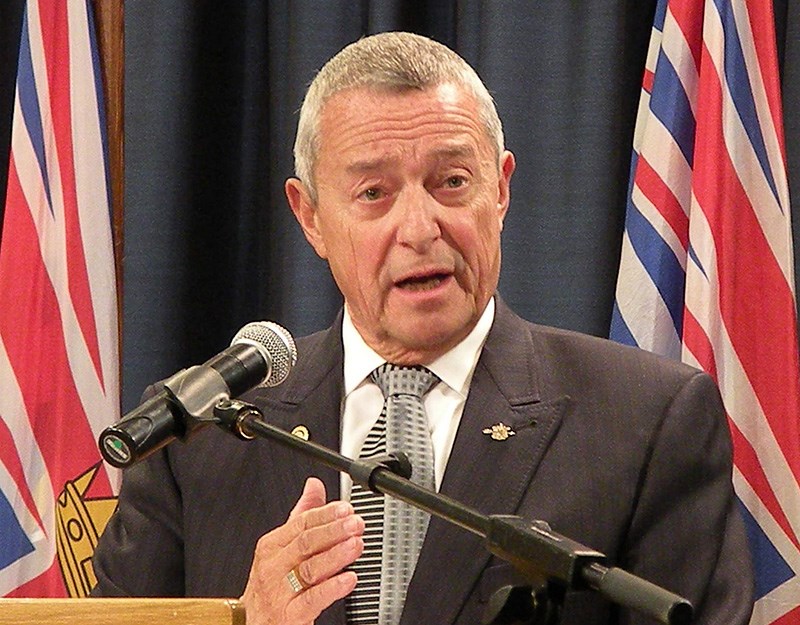The provincial minister responsible for TransLink says it may be possible to implement a road pricing system in Metro Vancouver to control traffic congestion without putting it to another referendum.
Peter Fassbender was responding to a new congestion pricing report from Canada's Ecofiscal Commission that urges harmonized bridge tolls in Metro as a pilot project ahead of a potential longer-range effort to bring in per-kilometre road use fees.
The report advocates a dynamic pricing model with tolls that differ by time of day to encourage more efficient road use. The aim would not be to raise net new revenue – money generated might instead be used to reduce existing gas taxes.
"If it was revenue-neutral and it was not seen as a new tax, then I think there is an option there," Fassbender said when asked if that scenario might escape the premier's referendum requirement.
"We have said if it is not a new source of funding or a new tax, then of course it doesn't need a referendum."
Fassbender qualified his comments with a series of cautions, noting any effort at mobility or congestion pricing would take many years and be complex.
"What form of capture of movement would you have? How would you implement that? What's the cost of the infrastructure to do that?" he asked. "I'm not sure it's as simplistic as the report alludes to in doing a pilot project."
He praised the road pricing report's authors as a credible group that included SFU professor and former TransLink board chair Nancy Olewiler.
"Do I think it's worth looking at? Absolutely. Do I say it's the solution? I'm not in a position to say that yet."
He said the province is reviewing its tolling policy, which forbids tolls on anything other than new infrastructure and then only if there's a free alternative.
The province wants to see business cases for the new Pattullo and Massey bridges before deciding on any tolling policy change, he said.
Fassbender also stressed the region still needs a long-term new revenue source that is fair and equitable to fund its share of the mayors' transit expansion vision, as well as future operating costs.
Premier Christy Clark last month said road pricing as a new revenue source for TransLink would require a referendum.
Metro Vancouver board chair Greg Moore also argued that "if it's just about pricing the road network and not about putting money into TransLink, you wouldn't need a referendum."
He argues dynamic road pricing is more fair than the gas tax, which area mayors have previously said they'd like to partially replace with road pricing.
Drivers who only stay on their local community roads still pay gas tax, he said, adding it might be argued that they should only pay for the regional transportation system when they drive longer distances or contribute to congestion at peak times.
"What if you said to the trucking industry 'You can use the road network for free from midnight to 5 a.m., but if you're going to use it in peak periods when everybody's trying to get to work, it's going to be a lot more expensive?'
"That policy could help shift your peak periods down so you're getting better use out of your current road network instead of having to build a lot more infrastructure."
Moore acknowledged a revenue-neutral road pricing system wouldn't solve the problem of where to get new funding for TransLink.
Any attempt at harmonized tolls would also have to cover the debt repayment costs of the Port Mann and Golden Ears bridges.
Pressure for Metro mayors and the province to hammer out a solution could intensify if the new federal Liberal government begins doling out billions of dollars in infrastructure grants.
Both Fassbender and Moore agree B.C. must ensure local rapid transit projects are not frozen out.
"We can't lose money to other parts of this country because we don't have our act together," Moore said.
Metro mayors' $7.5-billion 10-year plan was criticized during the regional sales tax referendum as being too much, too soon.
But that was before Justin Trudeau's Liberals were elected on a promise of big federal deficits to rapidly fund new infrastructure.
Moore noted Toronto and Montreal are proposing nearly $30 billion in projects over the same time frame.
The transit funding impasse may not hold up other infrastructure projects.
Metro Vancouver hopes to gain federal funding for its new Lions Gate wastewater treatment plant, estimated to cost up to $700 million, and plans to actively lobby new Liberal MPs.
"We are ready to go with that project," Moore said.
•••••
Bridge tolls, lower gas tax panned
One critic says the idea of harmonized bridge tolling coupled with offsetting cuts in the gas tax would be wasteful and counterproductive to efforts to fight climate change.
Environmental consultant Eric Doherty says the toll collection costs – which he estimates at 40 cents per crossing for the Port Mann Bridge – might devour more than a quarter of the revenue if a $1.50 toll was charged on all bridges.
"That 25 per cent collection cost is too high when you're thinking about every dollar of public money mattering," he said.
Doherty also objects to using road pricing revenues to cut gas taxes.
If the 17-cent-a-litre TransLink gas tax was slashed while electric vehicles were forced to pay new road fees, he said, their use would be discouraged rather than encouraged.
"You're basically creating an incentive to pollute more."



